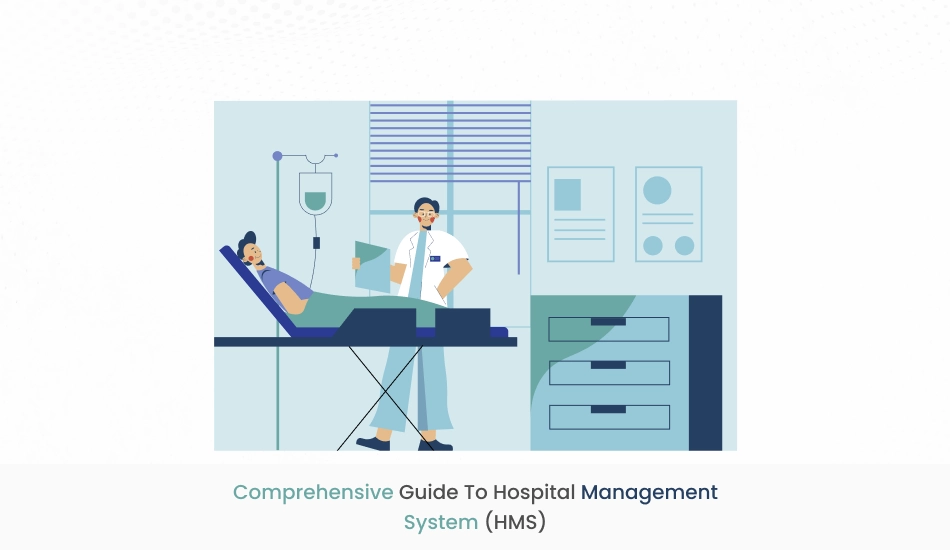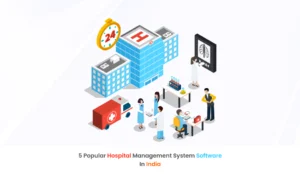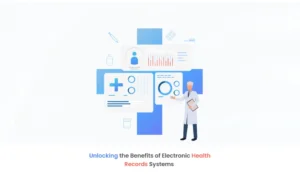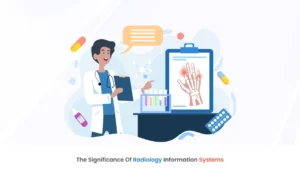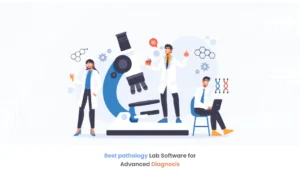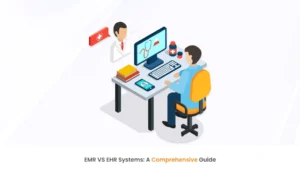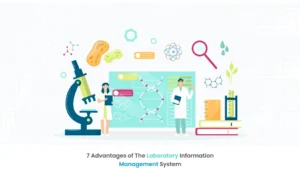Quick Summary
The Hospital Management System (HMS) is the ultimate solution for healthcare organizations. It manages entire hospital operations with a few clicks. This platform effectively handles entire departments, from clinical management to financial management. It minimizes human error and eradicates paper-based records, from filling out registration forms to receiving bills.
Overview of the Hospital Management System (HMS)
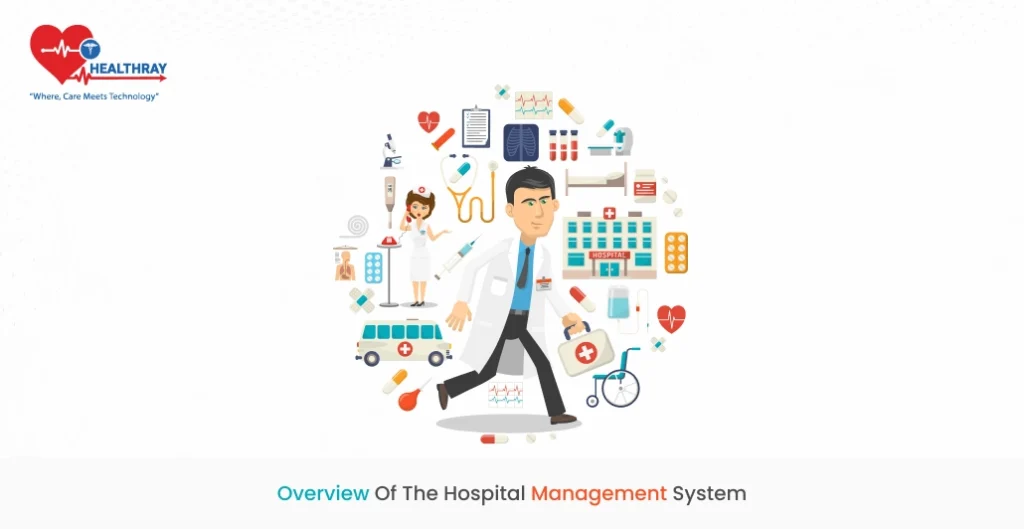
Running a hospital is not an easy task. Sometimes, it is overwhelming to handle patients and hospital work. If you are looking to simplify your healthcare operations, you have clicked on the right tab. Nothing seems impossible for the hospital management system (HMS), whether it is laboratory management or radiology management.
Managing the hospital requires a lot of time and effort. However, both are considered scarce resources in the medical field. There is always a question that occurs in the mind of a healthcare provider. Is there any software system that can take over the entire hospital’s work and save a doctor’s time while persistently increasing revenue?
With Healthray’s Hospital Management System, it is easy to manage all healthcare departments on a unified platform. It minimizes human effort and is a cost-effective platform. Moreover, it is time-efficient, which aids in revenue cycle management. Hospital management information systems record entire patient information with their medical history in a comprehensive manner.
What are the vital features of the Hospital Management System (HMS)?
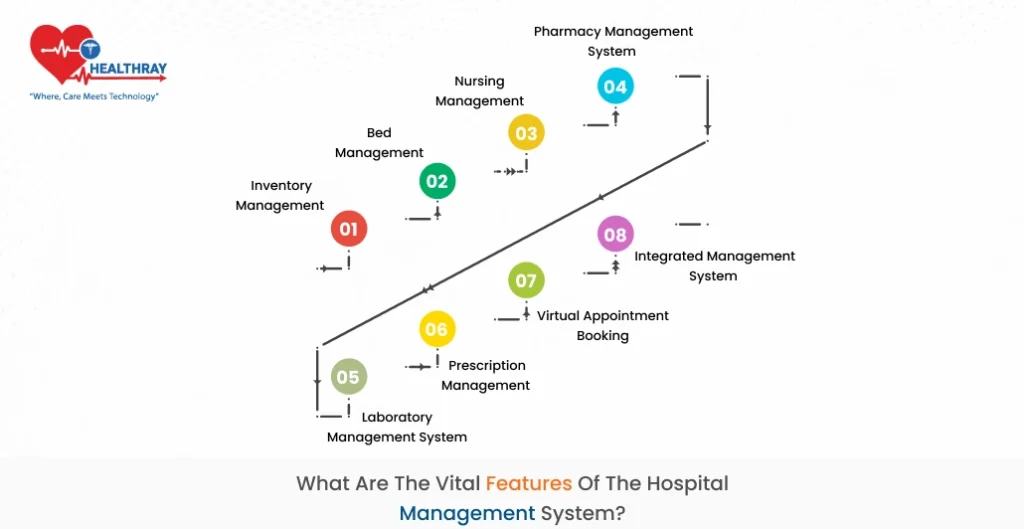
The hospital management system (HMS) offers diversified features that simplify the patient management system, whether it’s inpatient management or outpatient management. Consequently, it enhances patient care and simplifies the patient registration procedure. Also, facilitates speedy diagnostic service and reduces errors in patient treatment service. Look below for detailed hospital management system features:
1. Inventory Management :
HIMS software manages and tracks medication and equipment stock. Hospitals fully rely on Healthray, a leading hospital management system in India, for inventory management due to its wide range of AI capabilities. This HIS system platform records transactions, including ordering details, stock levels, transit information, and shipping details.
Furthermore, it records in an organized manner all vital inventory information. Hospital management software provides customization features that provide the facility to add columns and rows as per hospital requirements. Also, hospital information systems maintain vendor details with their digital bills to overcome future conflicting risks.
Inventory management aids in saving a large amount of time that is incurred in maintaining paper inventory records. Saves money, which is mainly invested in hiring staff for maintenance and preparing inventory records. AI in Hospital Management System maintains a steady amount of cash flow and an optimal level of inventory, which minimizes the risk of loss or theft.
2. Bed Management :
Bed management is a vital component for tracking patients and easing the bed allocation procedure. Facilitate real-time information that enhances patient care and aids in individual patient monitoring. It depicts a patient data flow diagram, simplifying the procedure of finding patients in a hospital. Thus, it improves patient conditions faster.
The hospital queue management system effectively follows the OPD flow chart in an organized way. There is always the burden of remembering individual patient information and tracks within the hospital as patients are moving around the hospital from the ICU to the general wards. Therefore, it is a daunting task for healthcare staff and also enhances the workload.
Furthermore, adopting a healthcare management system is the right choice to simplify staff work. Supports allocating staff and nurses according to the bed management data. It elevates inter-departmental collaboration among medical practitioners. Also, the Hospital Management Information System (HMIS) maintains high-quality care and ensures patient safety.
3. Nursing Management :
The hospital information system is providing benefits in managing and monitoring nurses’ performance. It provides detailed nursing duties in an electronic format, which they mark on digital devices after the completion of each activity. HMS software helps in making staffing decisions and assigning tasks based on their qualifications and experience.
This platform simplifies the procedure of performance appraisal through a detailed Hospital Management System (HMS) report that shows nurse staff performance in a graphical format. The hospital management system modules automatically set the standard to measure the nurse’s quality of work, which can be supervised by senior staff members.
4. Pharmacy Management System :
The major part of pharmacy is managing the optimal stock level, which is a troublesome process in the traditional healthcare system. Managing pharmacy staff and ensuring compliance with pharmacy regulations is the toughest process. To address these challenges, we are coming up with a comprehensive Healthray hospital information management software solution.
Managing pharmacy staff is a vital component of patients’s safety. In many countries, it is important to have at least one licensed pharmacist in the medical store. Having a staff portal eases performance measures and eradicates future conflict. Also, it enters all vendor details and persistently monitors stock levels to overcome over- and under-stocking situations.
5. Laboratory Management System:
It is the vital Hospital Management System component for managing whole laboratory operations through an automated platform. In laboratories, numerous documents are important to properly manage in MIS format and protect from forgery, theft, or loss. This task is daunting as it requires more effort, money, and time.
To simplify the lab work, we developed a full-fledged laboratory management software system that automates entire pharmacy tasks within a few clicks. Consequently, it eliminates the paper requirement and secures transactions by applying strict protocols. This aids in sample management with the recording of entire order details and sharing test results from digital devices.
6. Prescription Management :
Handwritten prescriptions are always a cause for concern, as they are difficult to understand by pharmacists and patients. All pharmacists deal with these issues regularly, and for newly hired staff, it’s more difficult to understand the medication terms. It is difficult for medical specialists to comply with the entire prescription regulations and monitor patient’s performance.
To handle the prescription stuff, we provide an ultimate hospital management software solution that can satisfy all types of healthcare specialists and enhance hospital work efficiency. Facilitate an electronic mode of prescription that maintains accuracy and medication quality, eliminates paper requirements, and minimizes human error.
7. Virtual Appointment Booking :
Hospital Management Information Software (HMIS) conducts hospital operational work with the simplest procedure; basically, it operates in the computer system, which reduces the hospital staff’s work burden in all departments, whether they’re financial or administrative. Through the hospital management system, it is easy to schedule appointments and get reminders on time.
Most of the time, doctors are absent from their workplaces and reschedule appointments; they are notified when patients visit hospitals. Hospital management systems aid in overcoming these situations by providing a holistic platform that simplifies billing procedures and maintains patient records. Thus, it is a time- and cost-efficient process for hospitals.
8. Integrated Management System:
The hospital management system incorporates different systems and different departments into a unified platform. It integrates with hospital operating systems for ease of administration work. Another key system is electronic medical records, which record entire hospital transactions in digital format to minimize manual error and maintain sustainability.
Additionally, it incorporated a laboratory management system and a pharmacy management system. This facilitates open communication channels between patients and healthcare experts. Below are some benefits of an integrated management system:
- Minimize redundancy.
- Increased coordination.
- Precise diagnostic
- Mitigating risk
- Enhanced patient satisfaction
9. Hospital Billing:
Medical billing has many different functional and non-functional requirements that are important to fulfill. It encompasses standardized medical protocols, a structured billing format, maintains security measures, and can be shared with any other medical department for the speedy recovery of patients.
The major advantage of digital medical billing is that it is structured in an electronic format that can be modified as per hospital prerequisites or changing medical protocols.
10. Patient Data Management:
The hospital management system maintains patient data comprehensively. It includes all patient details, from their medical information to their medical bills. This digital platform has several components, such as data collection, which includes patient information and test results. The hospital management system database securely records all information.
Furthermore, the entire data stored in a structured manner includes medical history, diagnostic reports, and prescription details. This patient management system adheres to each medical regulatory body, whether it is HIPAA or the National Health Authority. Therefore, it is also called a health management information system.
How do key benefits of the Hospital Management System (HMS) reshape healthcare organizations?
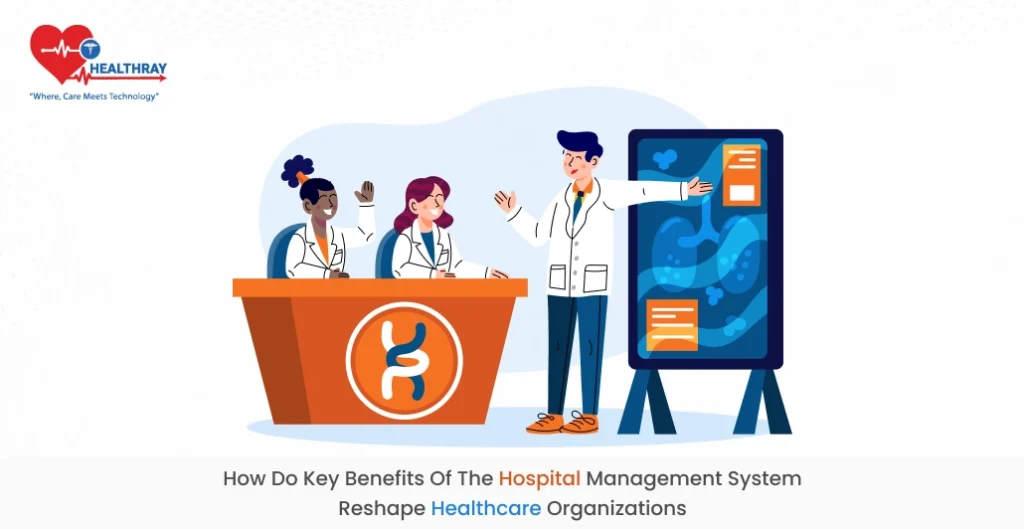
The hospital management system plays a vital role in revolutionizing the medical organization. It simplifies complex, large amounts of hospital data sets, which are difficult to interpret, and sometimes medical specialists are in a dilemma while overseeing medical reports and radiology images. Here are a few hospital management system benefits:
Reduces Medical Expenses:
This HIMS software collects patient data in an autonomous way, which reduces manual staff work and negligible human errors. The main aim of the hospital is to reduce overall healthcare expenses, which is only possible with Health Ray’s, the best hospital management software, which has vast functionalities for ease of hospital work and enhances patient satisfaction.
It computerized all hospitalization work in a few clicks, which required less healthcare staff, effort, and time. Prepared physical radiology images go through cumbersome processes that require lots of human effort and also affect staff health. To overcome this struggle, it’s important to adopt the E healthcare management system.
Enhanced Hospital Management Service:
This HIS system has vast features that are beneficial for all connected members of the hospital. It fosters a centralized management system in which patient and hospital records are in one place. The data is organized systematically, and all details are easy to navigate. Consequently, patients can gather all their medical transactions in one place.
This platform overall saves hospital costs and significantly increases healthcare revenue without any additional investment. Fostering online test results and prescription reports that eradicate the hospital queue system. Also, we can say it is a hospital database management system as it effectively manages types of hospital data.
Increased Departmental Collaboration:
The hospital management system encompasses different departments, enhancing inter-departmental coordination and patient care. Enable sharing with any healthcare department or specialists of the patient’s choice. Consequently, doctors can earn from the referral system. Glance below for the key advantages of departmental collaboration.
- Securely sharing documents.
- Enhanced medical knowledge
- Open communication with patients.
- Quickly resolve conflicts.
- Easy to share hospital goals.
Resource Optimization:
The hospital management system manages all types of healthcare resources, whether they are related to staff or equipment. Facilitate a human resource management system for recording healthcare staff details and their performance. Consequently, it assists in enhancing job satisfaction, reducing turnover rates, managing optimal inventory levels, and reducing vendor conflict.
Increased Hospital Revenue:
This software includes diverse departments for seamless integration with them. Therefore, it minimizes staff costs and increases patient contentment through the patient record management system. There is a huge scope of the hospital management system in healthcare for enhancing patient engagement. As a result, it expands hospital service and overall revenue.
Delving into the advantages of the hospital management system
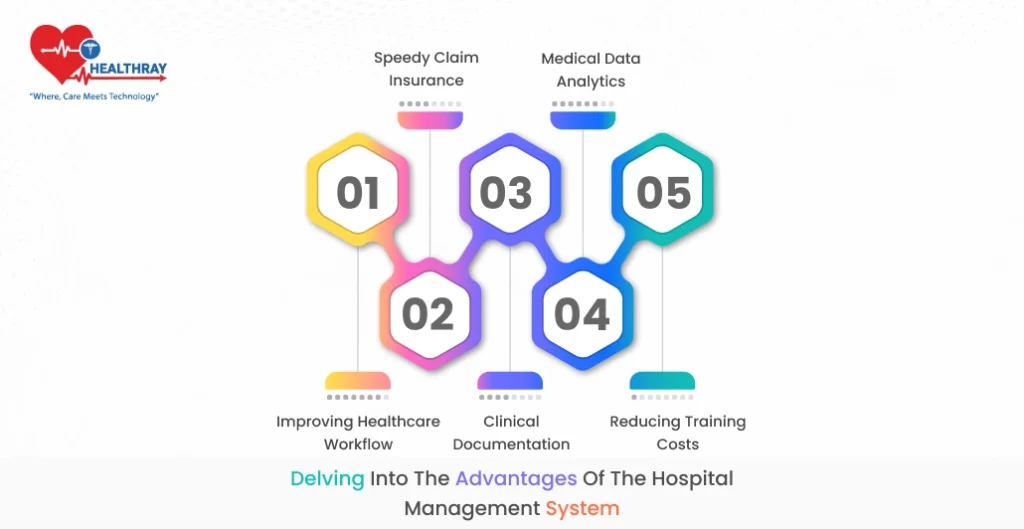
HIMS in healthcare reshapes the whole hospital structure, from patient registration to digital test results. Hospital management system advantages are vast. Here are a few of them:
Improving Healthcare Workflow:
The Hospital Information Management System (HIMS) follows a structured workflow, enhancing patient quality care and optimizing healthcare workflow. It eases administrative processes, from patient registration to medical billing. Access healthcare facilities in each corner, whether it is a remote or rural area. Providing ER diagrams saves hospital training costs.
Speedy Claim Insurance:
It’s important to have a steady cash flow in hospital organizations. Generally, this is the goal of every hospital. It is possible only through embracing HMS, which may be called the doctor management system. There are automated principles of modern software management that speed up insurance verification and the claim process. Look below at the brief advantages of fast claims:
- Enhanced patient contentment
- Minimize staff workload
- Reduces operational work
- Steady cash flow
- Lowers claim denials
Medical Data Analytics:
This platform consolidates medical data from multiple sources and depicts it systematically. After that, it displays necessary information in a single dashboard for fast treatment and accurate medical decisions. Also, medical reports can be shared with any medical specialist for precise analysis. As a result, it enhances the healthcare experience.
Step towards digital era with our healthcare solution
Revamp your hospital facilities and embrace change for better healthcare management. Ease in managing and organizing large medical datasets leads to effective analysis. Seize the opportunity now!
Clinical Documentation:
Encompasses a systematic process that records hospital and patient information within a few minutes. It streamlines the hospital process through automated entries and maintains transparency in medical records as it is accessible to any authorized provider. The prescription template simplifies healthcare work and aids in maintaining better hospital documentation.
Reducing Training Costs:
The hospital management system (HMS) provides a user-friendly interface and concise patient information. This is a unified platform for all hospital books and patient records. Therefore, it is easy to understand hospital work systems and culture through graphical flow charts. Also, hospital management services reduce recruitment costs by reducing hospital turnover.
Conclusion
The hospital management system (HMS) is the ultimate solution for database management systems (DBMS) for centralizing entire hospital data, operation theater management for better allocation of healthcare resources, and laboratory information management system for managing whole lab operations effectively. Thus, it enhances hospital efficiency and patient satisfaction.
